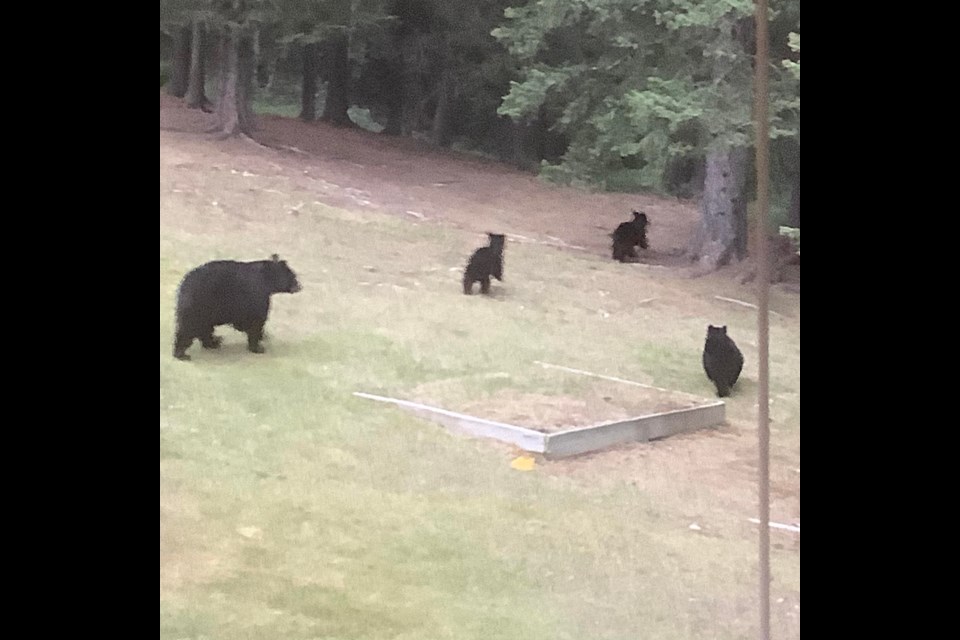A black bear that had been roaming the Bragg Creek area with her cubs for a few weeks was euthanized by Alberta Fish and Wildlife officers around 3 p.m. on Sunday, Aug. 28, orphaning three cubs and causing debate in the hamlet about bear-human interactions.
After their mother was euthanized, three cubs were then stranded up a tree for a few hours, causing some concern for local residents.
Renee Delorme, the founder of Bragg Creek Wild, said the death of the bear was unfortunately inevitable.
“Fish and Wildlife had no choice – that’s the protocol. But it’s very, very sad,” she said.
It marked the second death of a bear in Bragg Creek in recent weeks, following a collision between a car and a sow on Aug. 10.
Bragg Creek Wild is described on its website as a “local grassroots organization committed to improving the conditions for wildlife and people to live in community.”
Area resident and Bragg Creek Wild member Emma Barry heard the gunshot and went down to see what was going on. The four bears had been in her yard the previous week, and were well-behaved.
Barry said while the cubs were up the tree, the Fish and Wildlife officer from Strathmore explained the protocol involved in such a process.
“He said they could be considered to be habituated just as their mother was, and that he was prepared to euthanize the cubs as well,” she said, adding she heard a neighbour saw the three cubs make their escape into the woods about five hours later.
Barry said she and fellow Bragg Creek Wild member Dave Klepacki conveyed the view that the community would like to be involved in exploring the option of rehabilitation at a wildlife facility, and at some point, she said “the conversation shifted.”
Klepacki has a PhD in earth sciences and has been a Bragg Creek resident for 33 years. On Aug. 30, he said he had just spoken with the Fish and Wildlife district manager in charge of the case, who told him they were going to leave the cubs alone and monitor the situation.
The cubs are estimated to be about seven months old.
Bragg Creek Wild has been doing a wildlife inventory study over the last year, which Klepacki is involved in. The end goal will involve better education, and hopefully, better buy-in from residents.
“Three black bears have died here in the last six weeks, all of them because of human interaction,” he said.
“That’s on us.”
He said a biologist he’s spoken with used the human analogy that it’s like a mother sitting at a park bench with hungry kids and someone’s left a plate of cookies on the table, yet expects the kids not to eat them.
Alberta’s Fish and Wildlife spokespersons had not responded to a request for comment on Aug. 29. Updates will be posted to Cochrane Today once they are available.
Before the cubs could be turned over to a rehab facility, Fish and Wildlife officers would have to trap them. The ultimate goal of that hypothetical approach is to find a way to rehabilitate the cubs for an eventual return to their natural habitat.
Klepacki said that option is fraught with technical and legislative difficulties, and has been a subject of debate in the hamlet. If the cubs return and become a problem, he said there is a real possibility of another euthanization.
Barry said all through Kananaskis country, buffaloberries are tiny and dried out, which means one thing for hungry bears in the region.
“That makes up 70 to 75 per cent of the bears’ diet, so this is the beginning of more incidents,” she warned.
Delorme said situations like what transpired this week can be difficult for neighbours in a small community, as debate ensues over who is ultimately responsible if euthanization becomes necessary.
“People should be very mindful not to have garbage out,” she said. “We made a big push on that, but not everyone understands, and this was a case of that.”
Once bears become habituated to easy food sources, they will return again and again. And with colder weather just around the corner, cubs suddenly without a mother face a great challenge this time of year.
“There’s no hope in hell they’ll figure out how to survive a winter,” Delorme said.
Her group tried – with no success – to capture two cubs stranded recently near Redwood Meadows after their mother was killed in a vehicle collision.
To minimize contact between bears and humans, Fish and Wildlife advises the removal of all attractants (garbage, bird seed, food) from properties. Garage doors with garbage inside should also be closed.
At present, bear proof bins for storefronts are not mandatory in Rocky View County. Delorme said Bragg Creek Wild is planning to lobby the County to enhance its bylaws pertaining to bears. The proposed improvements to Rocky View County’s bylaws would result in enforceable, monetary penalties for failure to comply with proper ‘bear smart’ handling of attractants for residents and businesses, she added.
Anyone who sees the cubs is asked to immediately call the REPORT A POACHER line at 1-800-642-3800 and give the details to the officer on call.
More information on Bragg Creek Wild can be found at braggcreekwild.ca.



